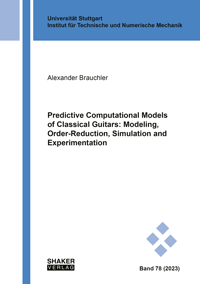
Shop : Details
Shop
Details
48,80 €ISBN 978-3-8440-9160-1Softcover176 pages84 figures260 g21 x 14,8 cmEnglishThesis
August 2023
Alexander Brauchler
Predictive Computational Models of Classical Guitars: Modeling, Order-Reduction, Simulation and Experimentation
Musical instrument making is often considered mysterious and almost magical, its secrets still escaping scientists’ models and measurements. There is no formula to make a good instrument, so historical examples are perceived as unattainable benchmarks. Examples
are the violins of Stradivari and the guitars of Torres, which serve as references and paradigms to follow. Many contemporary luthiers manufacture geometric copies of these instruments while failing to capture the acoustic specialties of the old master instruments.
The main reason for this is that the variability of the wood samples used to craft the instruments represents a significant source of uncertainty. In fact, no two pieces of wood are the same, and what is more, changing climate conditions are gradually altering the
characteristics of the wood used for musical instruments. The craftsmanship of instrument making has evolved slowly through expert knowledge gained over generations of luthiers based on empirical methods. However, state-of-the-art engineering methods, including
sophisticated numerical models, might hand luthiers a more systematic approach to overcome the challenges mentioned above. This thesis, focusing on the classical guitar, presents modeling approaches based on finite element models that can help to understand
the instrument better and help luthiers make better decisions about how to design their instruments. Throughout the thesis, the aspiration is to always combine numerical models with suitable experiments to verify the approaches alongside each other. For the example
of a single string, the capabilities of a numerical model to explain a very subtle physical effect are shown. The presented numerical model of the string can explain minor differences in the frequencies of different polarizations of the string by a torsional movement of the
string on the saddle. A large part of the thesis is then devoted to reverse-engineering a detailed finite element model of an existing guitar from computed tomography scans. This model is used to identify the material characteristics of assembled instruments by a sophisticated model updating approach, including uncertainty quantification methods. The method proves its ability by distinguishing two geometrically equal guitars by their material parameters. Besides delivering information about existing instruments, the material parameter identification procedure can, as actual model updating, enable models that can be utilized as virtual prototypes to quantifiably predict the influence of geometric changes on the vibrational behavior of an instrument. Based on these predictive models, a workflow is proposed that enables the manufacturing of acoustic copies of instruments. This methodology uses model-predicted geometric modifications to match the modal parameters of a reference instrument with a copy instead of copying the geometry of the original. Following the proposed workflow, two manufactured exemplary guitar soundboards are considered, of which one is geometrically modified to reach the same eigenfrequencies as
the other with great success. The methods utilized in the thesis range from experimental modal analysis over finite element modeling to efficient surrogate modeling approaches based on model order reduction and data-driven methods.
Keywords: Finite Element Method; Model Order Redcution; Musical Acoustics; Guitar; Experimental Modal Analysis
Schriften aus dem Institut für Technische und Numerische Mechanik der Universität Stuttgart
Edited by Prof. Dr.-Ing. Peter Eberhard, Stuttgart
Volume 2023,78
Available online documents for this title
DOI 10.2370/9783844091601
You need Adobe Reader, to view these files. Here you will find a little help and information for downloading the PDF files.
Please note that the online documents cannot be printed or edited.
Please also see further information at: Help and Information.
Please also see further information at: Help and Information.
| Document |  | Abstract | ||
| Type |  | |||
| Costs |  | free | ||
| Action |  | Download the file | ||
| Document |  | Document | ||
| Type |  | |||
| Costs |  | 36,60 € | ||
| Action |  | Purchase in obligation and download the file | ||
| Document |  | Table of contents | ||
| Type |  | |||
| Costs |  | free | ||
| Action |  | Download the file | ||
User settings for registered online customers (online documents)
You can change your address details here and access documents you have already ordered.
User
Not logged in
Export of bibliographic data
Shaker Verlag GmbH
Am Langen Graben 15a
52353 Düren
Germany
Am Langen Graben 15a
52353 Düren
Germany
Mon. - Thurs. 8:00 a.m. to 4:00 p.m.
Fri. 8:00 a.m. to 3:00 p.m.
Fri. 8:00 a.m. to 3:00 p.m.
Contact us. We will be happy to help you.



